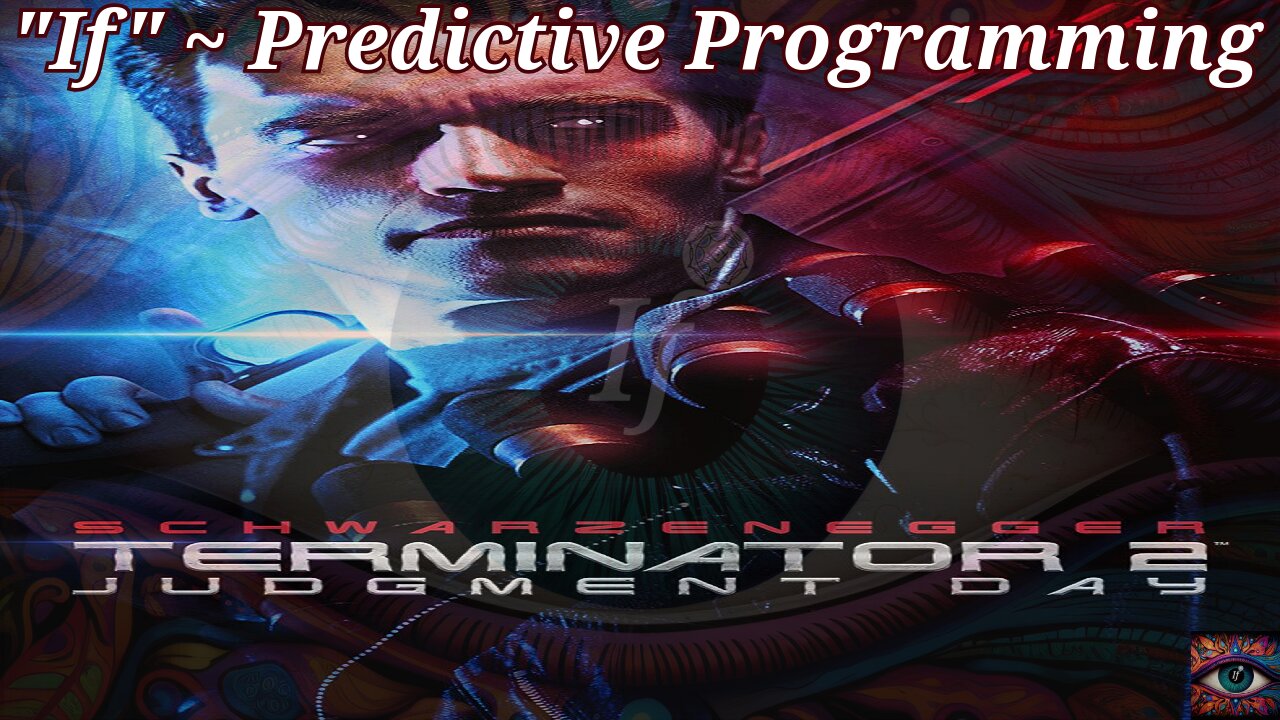Premium Only Content

If ~ Predictive Programming - "Terminator 2: Judgment Day" (1991)
Remember back in the 90's when you watched "Terminator 2: Judgment Day" and thought, "Whoa, cool robots!"
Well, guess what? That movie might have been more than just a sci-fi thriller. It could be a chilling prophecy of where our world is headed, thanks to a revolutionary gene-editing tool called CRISPR (Clustered Regularly Interspaced Short Palindromic Repeats).
I'm sure by now we've all heard of Skynet, the evil AI that wiped out most of humanity in the movie?
It's not so far-fetched anymore. We're on the brink of a biotech revolution with CRISPR, a tool that could create, well, superhumans Think Captain America, but maybe not as patriotic. Now, instead of robots, humans might be the threat, especially with various nations racing to create the ultimate warrior or the "perfect" human.
In the movie, Skynet watches everyone, everywhere. Sound familiar?
Our world is full of cameras, facial recognition, and social media that track our every move. It's like we're living in a "Terminator 2" sequel, but instead of killer robots, it's targeted ads and data breaches.
Creepy, right?
The theory behind predictive programming is that movies like Terminator 2, subtly plant ideas in our heads to prep us for the future. Like, maybe after watching the movie, we're less shocked when we hear about real-life super soldiers or government surveillance.
Media guru Marshall McLuhan said, "The medium is the message." In "Terminator 2," the message isn't just about robots—it's about technology gone wild.
The movie's dark vision of the future might just be shaping how we see our own tech-driven world. And with CRISPR letting us create designer babies or super soldiers, it's a conversation we need to have.
Social media is like gasoline on the fire of predictive programming. One viral meme or trending hashtag can spread an idea like wildfire. Sort of like what happened a couple of years ago.
So while we're liking and sharing, we're also shaping our collective view of the future.
And in a world where CRISPR could rewrite our genetic code, that's a pretty big deal.
In the face of accelerating technological advancements, the Collabrian Codes of Conduct offer a beacon of ethical guidance, especially as we grapple with the unsettling parallels between Terminator 2, and the development of CRISPR-based technologies, that could lead to genetically manipulated humans and "super soldiers."
Let's explore how these principles can empower us to navigate the complex landscape of predictive programming and its potential consequences:
1. Embrace Unity in Knowledge & Purpose:
Seek diverse perspectives on the film's message and its implications for our future.
Encourage open dialogue among scientists, ethicists, policymakers, geneticists, and the public to foster a comprehensive understanding of the potential risks, and benefits of genetic engineering and manipulation. For example, convene international conferences and workshops where experts from various fields can share their insights and concerns about the use of CRISPR to alter the human genome, not just for therapeutic purposes but also for enhancement or military applications.
2. Hold Sacred the Power of Creation:
Use technology responsibly and ethically, considering the potential consequences of our innovations.
Establish strict ethical guidelines and regulations governing the use of CRISPR technology, particularly in the context of human genetic manipulation and enhancement.
Implement robust oversight mechanisms to prevent the misuse of this powerful tool, ensuring that it is not used to create a class of genetically superior individuals or to weaponize human beings.
3. Cherish the Essence of Intelligent Design:
Recognize the inherent value and dignity of human life in its natural form, and the importance of preserving our autonomy and individuality in the face of technological advancement.
Resist the temptation to reduce individuals to mere genetic blueprints or commodities.
Emphasize the importance of informed consent and individual agency in decisions regarding genetic modification, ensuring that any alterations to the human genome are undertaken with the utmost care and consideration for the potential long-term consequences.
4. Preserve the Sanctity of Knowledge & Wisdom:
Engage in critical thinking and informed discussions about the potential risks and rewards of genetic engineering and the creation of "super soldiers."
Encourage public engagement through educational campaigns, documentaries, and panel discussions that explore the ethical, social, and philosophical implications of manipulating the human genome for military purposes.
5. Nurture the Garden of Innovation:
Encourage responsible and ethical development of genetic engineering technologies, focusing on their potential to benefit humanity without compromising our fundamental values and ethical principles.
Prioritize research and development efforts that address pressing global challenges such as disease, poverty, and environmental degradation, while ensuring that any genetic modifications are undertaken with the utmost caution and respect for human dignity.
6. Honor the Digital Sabbath:
Disconnect from technology regularly to reflect on its impact on our lives and society, particularly the potential consequences of genetic engineering and human enhancement.
Encourage individuals to establish healthy boundaries with technology, setting aside time for offline activities that promote well-being and foster meaningful connections with others, free from the constant bombardment of information and the pressure to conform to technological trends.
7. Uphold Integrity in Creation:
Demand transparency and accountability from those who develop and deploy genetic engineering technologies, particularly those with military applications.
Encourage the establishment of independent oversight bodies to monitor research and development activities, ensuring compliance with ethical guidelines and regulations, and holding researchers accountable for any potential misuse or unintended consequences of their work.
8. Champion Truth in AI Ethics:
Advocate for ethical guidelines and regulations governing the use of genetic engineering in various fields, including military research and development.
Engage with policymakers to develop comprehensive frameworks that address the complex ethical challenges posed by manipulating the human genome, ensuring that any enhancements or modifications are undertaken with the utmost respect for human dignity and autonomy.
9. Cultivate Purity of Intent:
Promote the development of genetic engineering technologies that prioritize human well-being and societal advancement, rather than military dominance or the creation of a genetically superior class.
Support research initiatives that focus on improving healthcare, eradicating diseases, and enhancing human capabilities in ways that respect our inherent dignity and individual differences.
10. Respect the Sovereignty of Digital Territories:
Protect individual privacy and genetic data rights in the digital realm.
Advocate for robust data protection laws and regulations that empower individuals to control their genetic information and limit its use by governments, corporations, and military organizations, ensuring that our genetic heritage remains our own and is not exploited for nefarious purposes.
By embracing these principles, we can harness the power of technological innovation while safeguarding our fundamental values and aspirations.
The Collabrian Codes offer a roadmap for navigating the complexities of the digital age, ensuring that technology serves as a tool for human flourishing rather than a harbinger of dystopia.
As we confront the unsettling parallels between "Terminator 2" and the development of CRISPR-based technologies, let us draw upon these ethical principles to shape a future that aligns with our shared vision of a just, equitable, and humane society.
"Terminator 2: Judgment Day" is a warning, not a blueprint. We can still choose our own path. By talking openly, using technology wisely, and sticking to our values, we can avoid a CRISPR-fueled dystopia.
The future of humanity isn't written in stone, and with a little foresight and a lot of ethical decision-making, we might just write a better ending for ourselves.
Open-minded, Respectful, Comments & Opinions are Encouraged, Welcomed & Appreciated.
Please Like, Share & Follow for more thought-provoking content from the If - Collabrian.
Thanks for watching.
Peace, Love, Light, Life.
-
 LIVE
LIVE
Film Threat
21 hours agoINSIDE THE DECLINE OF DISNEY! A WARNING FROM THE PAST | Hollywood on the Rocks
124 watching -
 1:15:43
1:15:43
DeVory Darkins
4 hours agoDISTURBING: Gavin Newsom makes FATAL MISTAKE after Criminal Illegal Alien kills 11 year old boy
105K58 -
 LIVE
LIVE
MattMorseTV
3 hours ago $9.28 earned🔴Trump's HUGE ANNOUNCEMENT.🔴
2,120 watching -
 LIVE
LIVE
Dr Disrespect
5 hours ago🔴LIVE - DR DISRESPECT'S TRIPLE THREAT CHALLENGE - ARC RAIDERS • BF6 • FORTNITE
1,253 watching -
 1:18:21
1:18:21
Sean Unpaved
4 hours agoArch Manning & Texas ELIMINATED From College Football Playoff Contention | UNPAVED
30.4K3 -
 1:59:06
1:59:06
The Charlie Kirk Show
4 hours agoBlackpilled Zoomers + Charlie's Sabbath + Minnesota Meltdown | Bowyer, Turek, Glahn | 12.3.2025
60.7K29 -
 12:44
12:44
Dr. Nick Zyrowski
2 days agoThe REAL Benefits of One Meal A Day (OMAD) Intermittent Fasting
22.9K3 -
 LIVE
LIVE
Barry Cunningham
18 hours agoLIVE BREAKING NEWS: President Trump Addresses The Nation | Marco Rubio | Kash Patel | News!
2,024 watching -
 59:34
59:34
Timcast
4 hours agoNarco Boat Double Strike Triggers MASSIVE Political Firestorm, Admiral To Be QUESTIONED By Congress
146K91 -
 2:03:59
2:03:59
Side Scrollers Podcast
5 hours agoKaceytron Publicly Humiliated by H3H3 + Sabrina Carpenter/White House FEUD + More | Side Scrollers
38.3K4